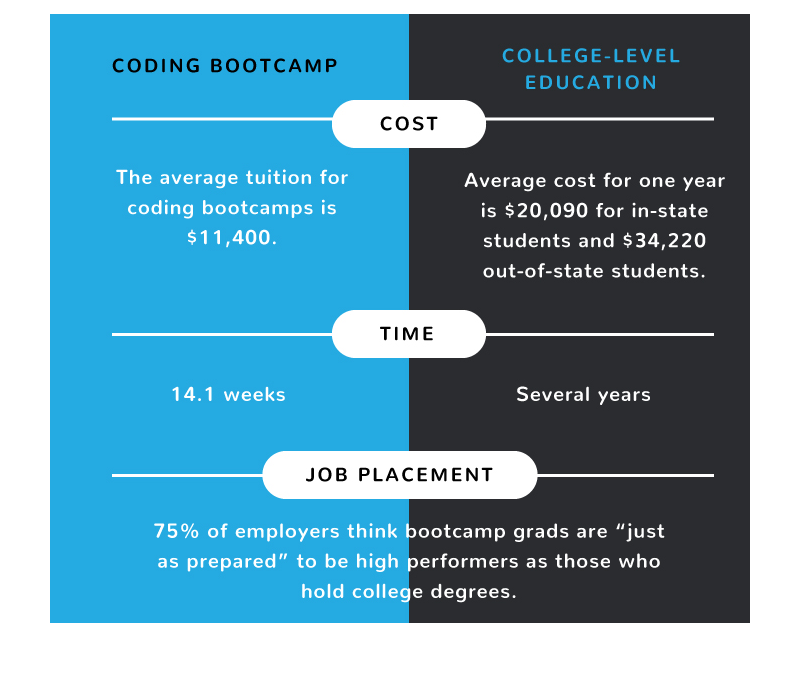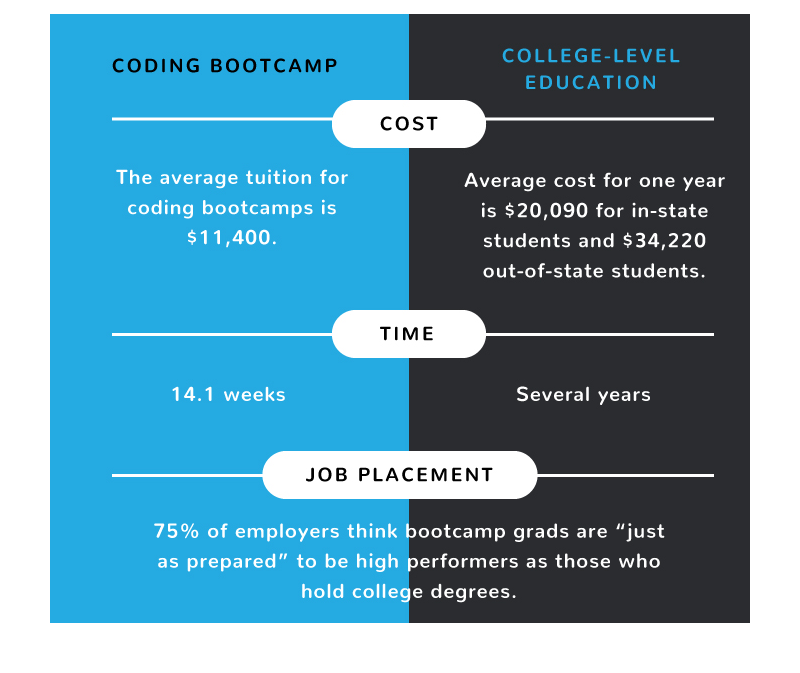Career Advancement: Why Attend Coding Bootcamp

Coding bootcamps offer a fast-track to a career in technology, providing intensive training that equips individuals with the skills needed to enter the tech industry quickly and effectively. This accelerated learning model contrasts sharply with the longer timeframe of traditional computer science degrees, making bootcamps a particularly attractive option for career changers or those seeking to upskill rapidly.
Coding bootcamps significantly accelerate career transitions into tech roles by delivering focused, practical training in high-demand programming languages and technologies. The curriculum is designed to be immediately applicable in real-world work environments, unlike some university programs which may prioritize theoretical knowledge over practical skills. This intensive, hands-on approach allows graduates to quickly build a portfolio of projects that demonstrate their competency to potential employers.
Successful Career Shifts After Bootcamp Completion
Many individuals have successfully transitioned into lucrative tech careers after completing coding bootcamps. For example, a former teacher with no prior coding experience enrolled in a full-stack web development bootcamp and secured a junior developer position at a prominent tech startup within six months of graduation. Another example is a marketing professional who, after completing a data science bootcamp, transitioned into a data analyst role at a large financial institution. These success stories highlight the transformative potential of bootcamp training.
High-Paying Job Placement of Bootcamp Graduates
Bootcamp graduates frequently secure high-paying jobs. While specific salaries vary based on location, specialization, and experience, many bootcamp graduates report starting salaries comparable to or exceeding those of entry-level positions requiring traditional computer science degrees. For instance, a recent report indicated that the average starting salary for a bootcamp graduate in software engineering was $75,000 annually in a major metropolitan area. Anecdotal evidence supports this, with numerous stories of graduates securing six-figure salaries within their first year.
Job Placement Rates: Bootcamp vs. Traditional Computer Science
While precise comparisons are difficult due to variations in data collection methodologies, several studies suggest that coding bootcamps boast impressive job placement rates. Although direct comparisons to traditional computer science graduates’ placement rates are not always available in a perfectly standardized format, bootcamps often highlight their high placement rates as a key selling point, often exceeding 80% in some cases. This high placement rate is frequently attributed to the intensive, project-focused curriculum and the career services provided by many bootcamps.
Types of Jobs Secured by Bootcamp Graduates, Why attend coding bootcamp
The types of jobs secured by bootcamp graduates are diverse and reflect the broad range of specializations offered by different bootcamps. Common roles include: front-end developer, back-end developer, full-stack developer, data scientist, data analyst, UX/UI designer, and DevOps engineer. The specific job title often depends on the bootcamp’s curriculum and the individual graduate’s chosen specialization. Many graduates also find employment in roles such as QA testers, technical writers, or project managers, leveraging their newly acquired technical skills to excel in these complementary areas.
Learning Environment

Coding bootcamps offer a significantly different learning experience compared to traditional educational settings. The immersive and intensive nature of these programs is designed to accelerate skill acquisition and prepare students for immediate entry into the tech workforce. This accelerated learning environment necessitates a high level of commitment and self-discipline from students, but the rewards—both in terms of skills gained and career prospects—often justify the effort.
The intensity of a bootcamp is often characterized by a packed curriculum, long hours of study, and frequent projects. This concentrated learning approach forces students to quickly master fundamental concepts and develop practical coding skills. The fast-paced environment simulates the pressures and demands of a real-world software development environment, preparing graduates for the challenges they’ll face in their careers.
Learning Styles Offered by Bootcamps
Bootcamps cater to diverse learning preferences by offering various learning modalities. In-person bootcamps provide a highly interactive environment with direct access to instructors and peers. Students benefit from face-to-face collaboration, immediate feedback, and the energy of a shared learning space. Online bootcamps offer flexibility and accessibility, allowing students to learn from anywhere with an internet connection. This asynchronous learning format suits individuals with busy schedules or geographical limitations. Hybrid bootcamps combine the benefits of both in-person and online learning, offering a flexible approach that balances structured in-person sessions with the convenience of online resources and asynchronous learning. The optimal learning style depends on individual preferences, learning styles, and scheduling constraints.
Mentorship and Networking Opportunities
A key advantage of coding bootcamps is the access to mentorship and networking opportunities. Many bootcamps incorporate mentorship programs, pairing students with experienced developers who provide guidance, support, and career advice. These mentors often serve as valuable resources, offering insights into industry trends and best practices. Furthermore, the cohort-based nature of bootcamps fosters a strong sense of community and allows students to build valuable professional networks. The collaborative projects and group work inherent in the bootcamp curriculum provide ample opportunities to network with peers, build professional relationships, and learn from each other’s experiences. Many bootcamps also organize networking events and workshops, connecting students with potential employers and industry professionals.
Collaborative Projects and Peer Learning
Coding bootcamps emphasize collaborative projects and peer learning. Students frequently work in teams on real-world projects, mimicking the collaborative nature of software development in professional settings. These projects not only develop technical skills but also enhance teamwork, communication, and problem-solving abilities. The peer learning environment allows students to learn from each other’s strengths and weaknesses, fostering a supportive and collaborative learning community. Examples of collaborative projects might include building a web application, developing a mobile game, or creating a data analysis tool. The collaborative process itself provides valuable learning experiences, teaching students how to work effectively in teams and manage complex projects.
Support Systems for Students
Coding bootcamps generally provide robust support systems to help students succeed. Career services are often a significant component of the bootcamp experience, providing assistance with resume writing, job searching, and interview preparation. Many bootcamps offer access to job boards, networking events, and mock interviews to help students secure employment after graduation. Technical assistance is also readily available, with instructors and teaching assistants providing support to students struggling with specific concepts or coding challenges. This may include office hours, online forums, or one-on-one tutoring sessions. The availability of these support systems is crucial for ensuring student success and facilitating a smooth transition into the tech industry.


Tim Redaksi